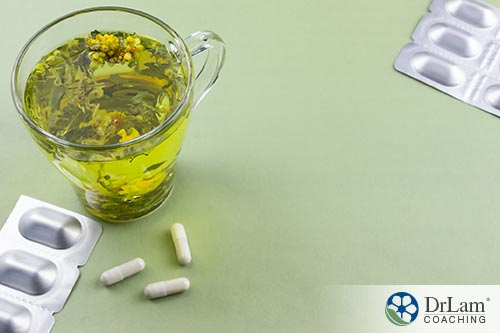 "That is my cup of tea!” is a popular phrase. However, have you ever wondered what is in a cup of tea that makes it one of the most relaxing drinks in the world? It is also a means of social interaction while acting as a stress reliever. The consumption of tea is linked to positive outcomes for your health due to its many components. L-theanine is one such component that contributes to the relaxing properties of tea. Let's learn more about L-theanine, its benefits, associated risks, and how it affects your mind and body.
"That is my cup of tea!” is a popular phrase. However, have you ever wondered what is in a cup of tea that makes it one of the most relaxing drinks in the world? It is also a means of social interaction while acting as a stress reliever. The consumption of tea is linked to positive outcomes for your health due to its many components. L-theanine is one such component that contributes to the relaxing properties of tea. Let's learn more about L-theanine, its benefits, associated risks, and how it affects your mind and body.
L-theanine is an amino acid and also known as γ-glutamylethylamide. It is mainly found in the green tea plant, Camellia sinensis. Some other species of Camellia, and the edible mushroom, Xerocomus badius or bay boletes also contain L-theanine. A single cup of tea normally contains about 25 mg of l-theanine. L-theanine crosses the blood-brain barrier and reaches maximum concentrations between 30-120 minutes. It is responsible for the typical umami or pleasant savory taste of tea.
L-theanine is beneficial both for your mental and physical health. Its uses include increased mental performance and focus, decreased anxiety and depression, and improved quality of sleep. It also optimizes your vital signs and has a role to play in cancer management and immunity.
L-theanine increases your mental performance whether you are a student or a professional. It raises alertness, concentration, and reduces mental fatigue. This helps in memory and learning in students and facilitates stress balance at work. Evidence has shown beneficial results on cognitive function in healthy adults post-treatment with a combination of L-theanine and caffeine. Subjects who consumed 100 mg L-theanine combined with 50 mg of caffeine had a greater increase in the attention focus and reduced error in tasks than those who consumed them alone. This was indicated by an increase in hit rate and target discriminability of shifting tasks involving high attention. An electroencephalogram (EEG) showed an increase in alpha waves that represent the awake and relaxed state of brain function.
Similarly, researchers have concluded that the combination of L-theanine and caffeine improves sustained attention and overall cognitive performance in children with attention deficit hyperactivity disorder (ADHD). There is a possibility of a reduction in wandering thoughts during tasks requiring attention. The combination seems to reduce the impulsivity while administering L-theanine and caffeine alone increased the impulsivity in children.
L-theanine decreases your stress and anxiety. It has a beneficial effect on adrenal fatigue. It facilitates relaxation of the body and promotes a state of serene alertness. Researchers have shown that the stress response to a multitasking cognitive stressor, was significantly reduced one hour after administration of the L-theanine drink to healthy adults when compared to placebo. The salivary cortisol response to the stressor was decreased three hours post-dose after active treatment. Studies have also suggested that it is effective in decreasing anxiety in patients with other mental health conditions such as schizophrenia and schizoaffective disorder.
L-theanine has a positive effect on your mood and alleviates depressive symptoms. Researchers have revealed the association between tea consumption and the risk of depression. Various constituents of tea such as polyphenols and their metabolites also affect depression; however, L-theanine has a predominant effect.
 L-theanine has a useful effect on the quality of sleep. It helps you to sleep better and have a calm, restful sleep. For the most part, L-theanine is relaxing in nature instead of sedating and lessens your anxiety. Various studies have shown that administration of 250-400 mg of L-theanine has an immense worthwhile effect on the quality of sleep. L-theanine lowers the resting heart rate, a contributing factor in its relaxing action. Moreover, researchers have reported that the combination of L-theanine and γ-Aminobutyric acid (GABA), the main inhibitory neurotransmitter has a positive synergistic effect on the quality and duration of sleep. The combined effect is better when the GABA or L-theanine is used alone. The GABA receptors are increased that modulate the neuroprotective effects of GABA/L-theanine combination, which probably affects sleep behavior.
L-theanine has a useful effect on the quality of sleep. It helps you to sleep better and have a calm, restful sleep. For the most part, L-theanine is relaxing in nature instead of sedating and lessens your anxiety. Various studies have shown that administration of 250-400 mg of L-theanine has an immense worthwhile effect on the quality of sleep. L-theanine lowers the resting heart rate, a contributing factor in its relaxing action. Moreover, researchers have reported that the combination of L-theanine and γ-Aminobutyric acid (GABA), the main inhibitory neurotransmitter has a positive synergistic effect on the quality and duration of sleep. The combined effect is better when the GABA or L-theanine is used alone. The GABA receptors are increased that modulate the neuroprotective effects of GABA/L-theanine combination, which probably affects sleep behavior.
L- theanine leads to changes in vital signs such as blood pressure, heart rate, and temperature. In other words, L- theanine decreases the physical symptoms of stress such as increased blood pressure and heart rate. These are attributed to the relaxing effects on the vasculature causing the blood vessels to dilate. Researchers have shown that there is a greater decrease in blood pressure in adults who have a higher stress response when presented with mental tasks. L-theanine also decreased the constrictive effect of caffeine on blood vessels and led to a decrease in blood pressure. Further, studies have demonstrated that the vasodilatory effect of L-theanine on blood vessels also causes a rise in body surface temperature due to increased blood flow.
L-theanine has broad therapeutic use in the management of cancer. L-theanine in tea as well as Bay mushroom has anti-cancer effects. Evidence has revealed that when found in the Bay Bolete mushrooms, it functions to boost the action of some chemotherapy medications. Likewise, there is a positive association between the consumption of tea to the reduction on the development of different cancers as shown by several studies. Researchers have also illustrated that theanine suppressed the growth and migration of human lung cancer and leukemia cells.
L-theanine protects you against upper respiratory tract infections. Numerous studies have shown that taking L-theanine could enhance the immune system in people of all ages. This decreases their possibility of getting common colds or the flu. Its anti-inflammatory and antioxidant role is responsible for its role in immunity.
In general, it is safe to consume teas that contain L-theanine or take its supplements. However, you should not consume too much.
Drinking excess caffeinated tea can lead to nausea, indigestion, and annoyance as caffeine in large amounts can irritate the stomach lining and unsettle the mind.
Other components in tea might interfere with the effects of drugs used in cancer.
L-theanine may interact with medications for managing blood pressure and ADHD.
Pregnant, breastfeeding women or children should not drink excess tea to prevent the effects of caffeine.
A safe and conclusive dosage for L-theanine is not yet known. Drinking tea in moderate amounts is usually considered safe. Some experts recommend dosages between 200-400 mg for 4-6 months as safe. In case you are thinking of trying using L-theanine supplement, it is better to consult with your health coach before using it.
 Tea is consumed as a relaxing drink and L-theanine helps with symptoms of stress, fatigue, and sleeplessness. L-theanine acts by decreasing the NeuroEndoMetabolic (NEM) stress response. The NEM system is your body’s way of handling stress. There are six circuits of organs and systems involved in the NEM stress response that operate against stress. The primary circuit that is suppressed by the action of L-theanine is the Neuroaffect Circuit. The Neuroaffect Circuit is composed of the brain, autonomic nervous system, and the microbiome in the gut. The autonomic nervous system consists of multiple branches of the sympathetic nervous system (SNS), the adrenomedullary hormonal system (AHS), and the parasympathetic nervous system (PNS).
Tea is consumed as a relaxing drink and L-theanine helps with symptoms of stress, fatigue, and sleeplessness. L-theanine acts by decreasing the NeuroEndoMetabolic (NEM) stress response. The NEM system is your body’s way of handling stress. There are six circuits of organs and systems involved in the NEM stress response that operate against stress. The primary circuit that is suppressed by the action of L-theanine is the Neuroaffect Circuit. The Neuroaffect Circuit is composed of the brain, autonomic nervous system, and the microbiome in the gut. The autonomic nervous system consists of multiple branches of the sympathetic nervous system (SNS), the adrenomedullary hormonal system (AHS), and the parasympathetic nervous system (PNS).
When stress is acute, your body responds by rapidly increasing the cortisol, the anti-stress hormone released from the adrenal glands. However, the adrenals decrease the cortisol under conditions of prolonged, chronic stress due to fatigue. This leads to Adrenal Fatigue Syndrome (AFS). The symptoms include fatigue, problems with sleeping, lack of concentration, memory loss, mild depression, and infections. Fatigue, brain fog, and difficulty sleeping can make your life miserable.
In adrenal fatigue, there is no cortisol which can oppose epinephrine that is released by the adrenal gland. This leads to a surge in the levels of epinephrine in your body. This impacts your biological clock, its function, and output that causes an imbalance of the neurotransmitters as well. Your sleep pattern is disturbed and you have difficulty in falling asleep or staying asleep. When the disproportion of the hormones and neurotransmitters further harms your brain, mental health conditions such as anxiety and depression develop. Also, the changes in your gut microbiome can lead to leaky gut. This permits bacteria, other pathogens, and toxins to access the bloodstream and the rest of the body. The immune process is triggered and the outcome is a significant amount of inflammation. Inflammation originating in the gut causes several mental health issues.
L-theanine decreases your physical and mental fatigue. It promotes relaxation of your mind and body and improves your energy levels. Thus, it rejuvenates your ability to be more productive and lead a balanced life.
You can make some changes in your life in case you are bothered by stress, fatigue, and mental health conditions.
No matter what plan of action you decide to take, however, please seek advice from your healthcare practitioner who will assess your particular situation and advise whether L-theanine is right for you.
If you would like to get additional information about the benefits of L-theanine, the team at Dr. Lam Coaching can help. We offer a free** no-obligation phone consultation at +1-626-571-1234 where we will privately discuss your symptoms and various appropriate choices. You can also send us a question through our Ask The Doctor system by clicking here.
L-theanine acts as a remedy both for your mental and physical health. It helps in the alleviation of adrenal fatigue, mental health conditions, and sleep problems. The benefits of L-theanine include increased mental performance, decreased stress, restoration of vital signs, and cancer management.
